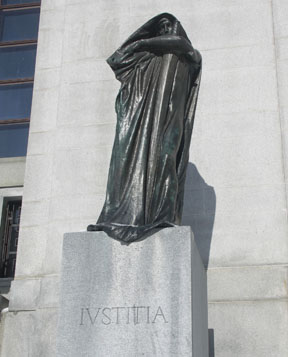The Supreme Court of Canada’s decision today in the Réjean Hinse case, although disappointing, does include “a slight progression of the law in favour of the wrongly convicted,” says a lawyer for the Association in Defence of the Wrongly Convicted, an intervener in the case.

In
Hinse v. Canada (Attorney General), the court dismissed Hinse’s appeal of a Quebec Court of Appeal ruling from last summer. The appeal court had overturned a 2011 Quebec Superior Court decision ordering the federal attorney general to pay him nearly $5.8 million in damages and other costs. The SCC’s decision means he will not receive any of those damages or costs.
As summarized in today’s decision, the 2011 ruling against the attorney general was on the grounds the minister had “committed a fault of ‘institutional inertia’ or ‘institutional indifference,’ and that a sustained, concerted and extensive review would have uncovered the errors” involved in his review of Hinse’s case.
Last summer’s Court of Appeal ruling, on the other hand, clarified that “the Crown can be held liable only if the decision was made in bad faith, and with malice,” the summary adds.
In its ruling today, the Supreme Court appears to offer a further clarification: “It would be inappropriate to apply a standard of fault that limits bad faith to malice..
Nevertheless, it continues, “In this case, H has failed to prove, on a balance of probabilities, that the Minister acted in bad faith or with serious recklessness in reviewing his applications for mercy. The documentary evidence negates the trial judge’s inference that there was no review whatsoever of H’s initial application for mercy. Although there are only a few documents in the record, they attest to the fact that a certain review was conducted and that certain actions were taken in this regard.”
Responding to the ruling, Brian Greenspan, who represented the Association in Defence of the Wrongfully Convicted, says he was disappointed the Supreme Court failed to recognize a distinction advanced in the trial both by Hinse’s own counsel and the team representing AIDWYC, between “the decision-making and policy function exercised by the minister and the failures which occurred here attributable to the bureaucracy.
“What was argued was a standard of negligence appropriate in civil cases to the failings of the operational side of the ministry — in other words, the way in which the application was treated by the bureaucrats,” Greenspan says. “And we argued that here there were serious failings, serious delays, a serious failure to provide the minister with the appropriate materials in a thorough and comprehensive review essential to the minister’s decision-making.
“The focus was directed at the bureaucracy’s response, and it was our view, which obviously the court hasn’t accepted, that that’s where the damages attributable to the federal government, should flow [from].”
However, Greenspan adds, the Supreme Court’s clarification that bad faith in deciding the liability of ministers should not be limited to malice could have some impact in similar cases where wronglfully accused are seeking compensation.
“Certainly they’re saying that you don’t need malice to find liability for the minister. So this case does at least clarify the fact that the minister doesn’t have to demonstrate malice to be civilly responsible.”
Hinse was sentenced to 15 years in prison for armed robbery in 1964, and was granted parole after serving five years. Maintaining his innocence, between 1967 and 1981 he applied three times for mercy to the federal minister of justice and applied as well to the Governor General in Council for a pardon. All these requests plus a fourth application for mercy in 1990 were denied.
A Quebec Police Commission ruling in 1989 declared he was the victim of a botched investigation, and finally, in 1997, the Supreme Court of Canada acquitted him.
Hinse then sued both the province of Quebec, the town of Mont-Laurier, and the federal attorney general. In out-of-court settlements, Quebec and Mont-Laurier agreed to pay him $5.55 million. After a lawsuit heard by the Quebec Superior Court, the attorney general was ordered to pay Hinse nearly $5.8 million. But the federal government appealed the decision with the Quebec Court of Appeal, leading to last summer’s ruling.
“We are honoured to have had the privilege to represent Mr. Hinse in fighting the gross miscarriage of justice of which he was a victim. However, we are very disappointed that a happier conclusion to an ordeal that has lasted some 50 years was not reached,” said Guy Pratte, a partner Borden Ladner Gervais. “We are grateful to all those who supported Mr. Hinse, and sincerely hope that any lawyer who has the chance to assist victims of injustice will seize the opportunity to do so. There is no greater calling for a lawyer than to try to right wrongs.”

 In Hinse v. Canada (Attorney General), the court dismissed Hinse’s appeal of a Quebec Court of Appeal ruling from last summer. The appeal court had overturned a 2011 Quebec Superior Court decision ordering the federal attorney general to pay him nearly $5.8 million in damages and other costs. The SCC’s decision means he will not receive any of those damages or costs.
In Hinse v. Canada (Attorney General), the court dismissed Hinse’s appeal of a Quebec Court of Appeal ruling from last summer. The appeal court had overturned a 2011 Quebec Superior Court decision ordering the federal attorney general to pay him nearly $5.8 million in damages and other costs. The SCC’s decision means he will not receive any of those damages or costs.